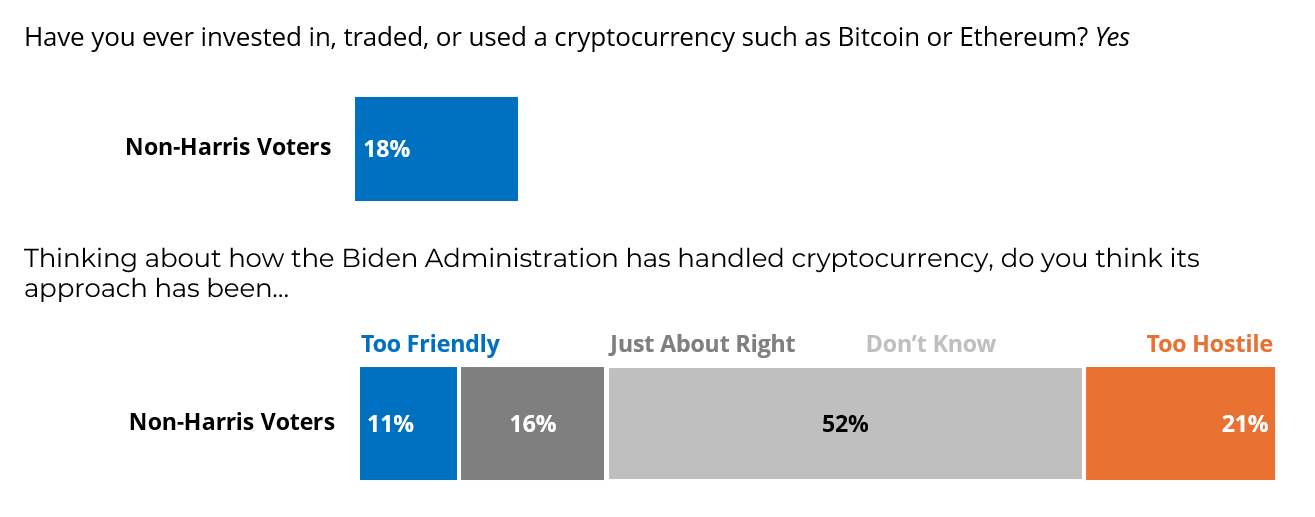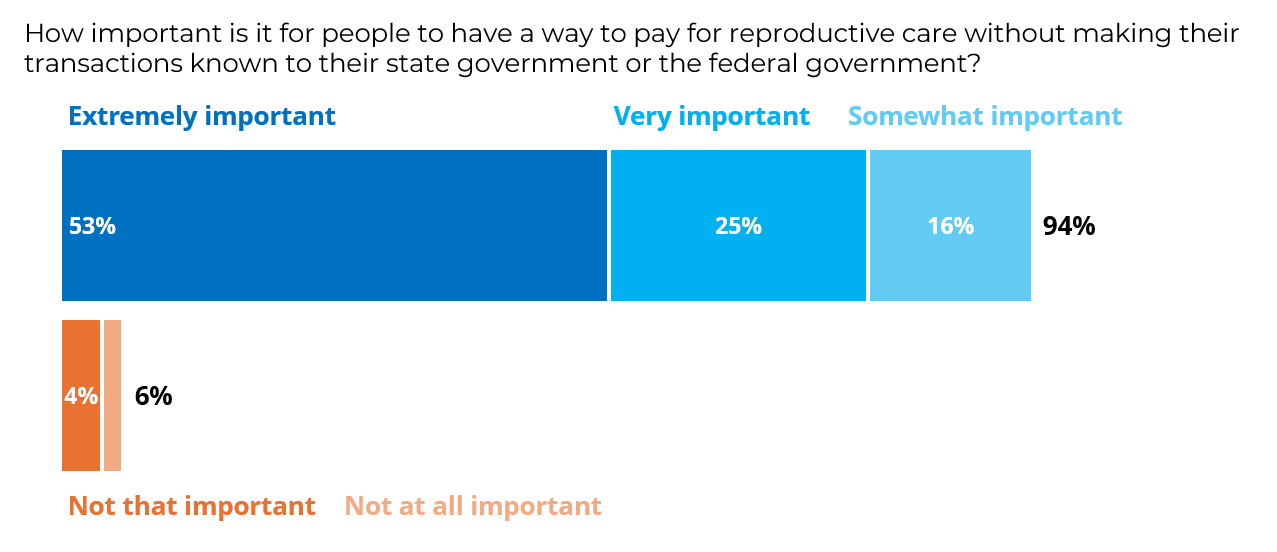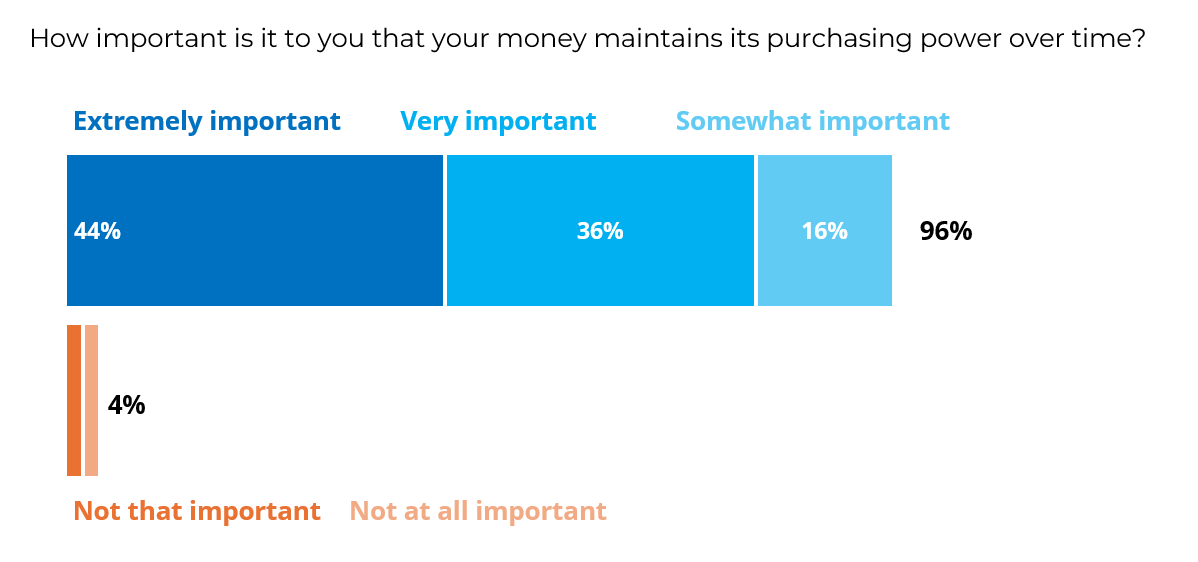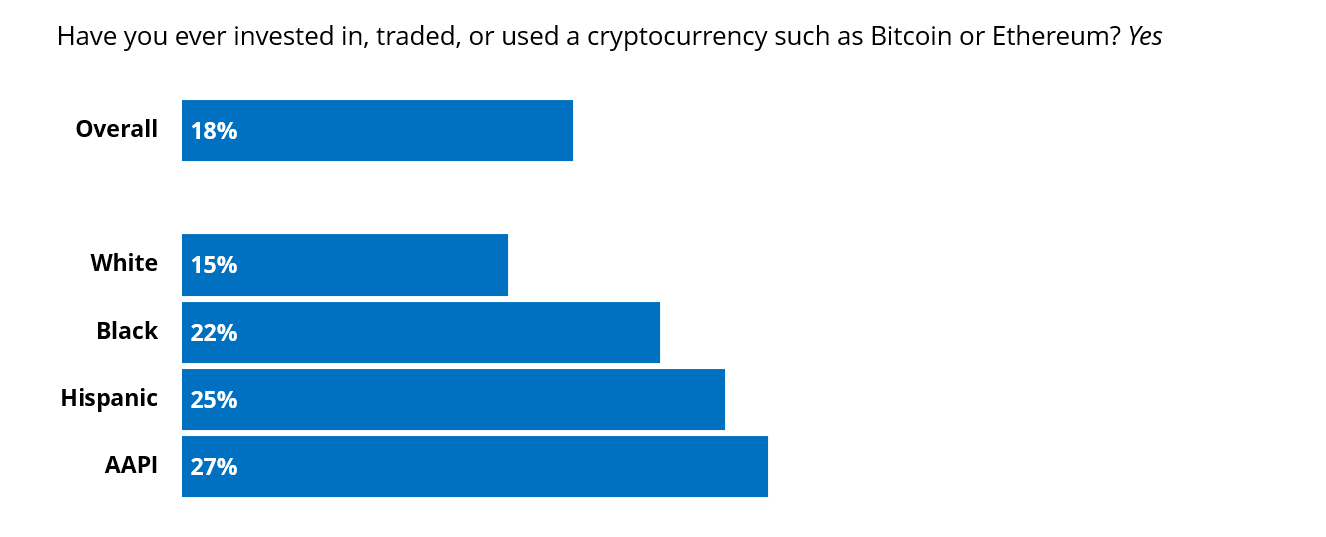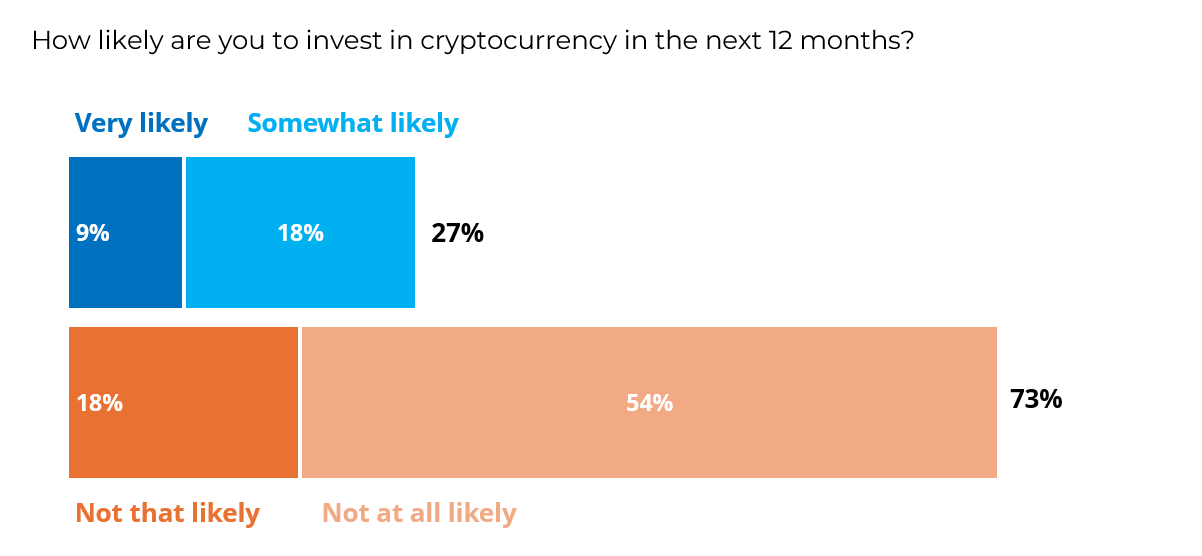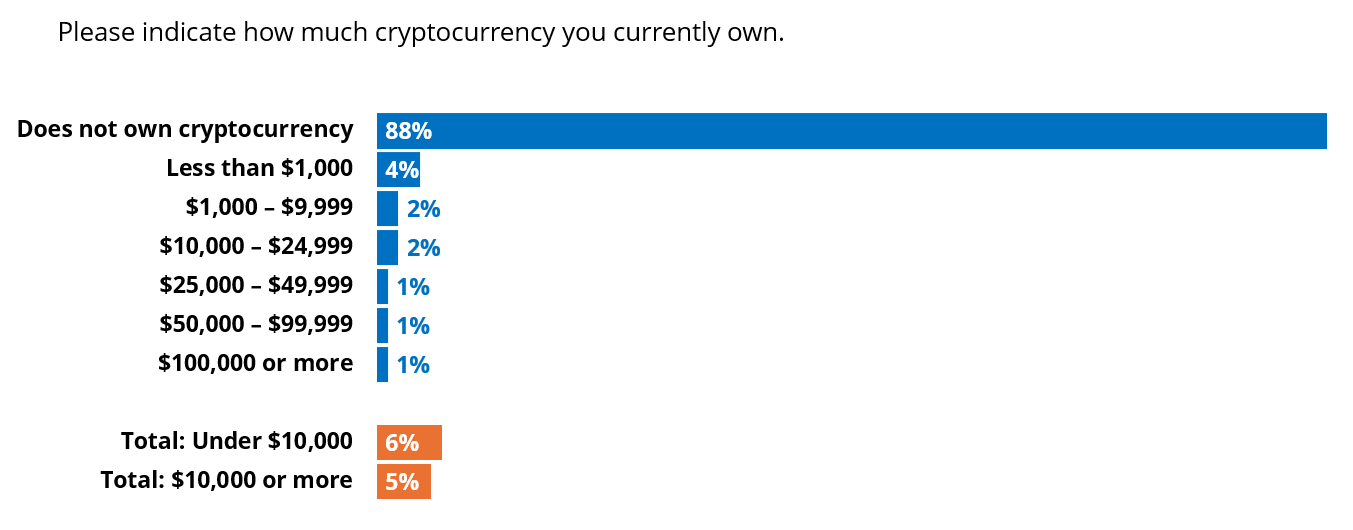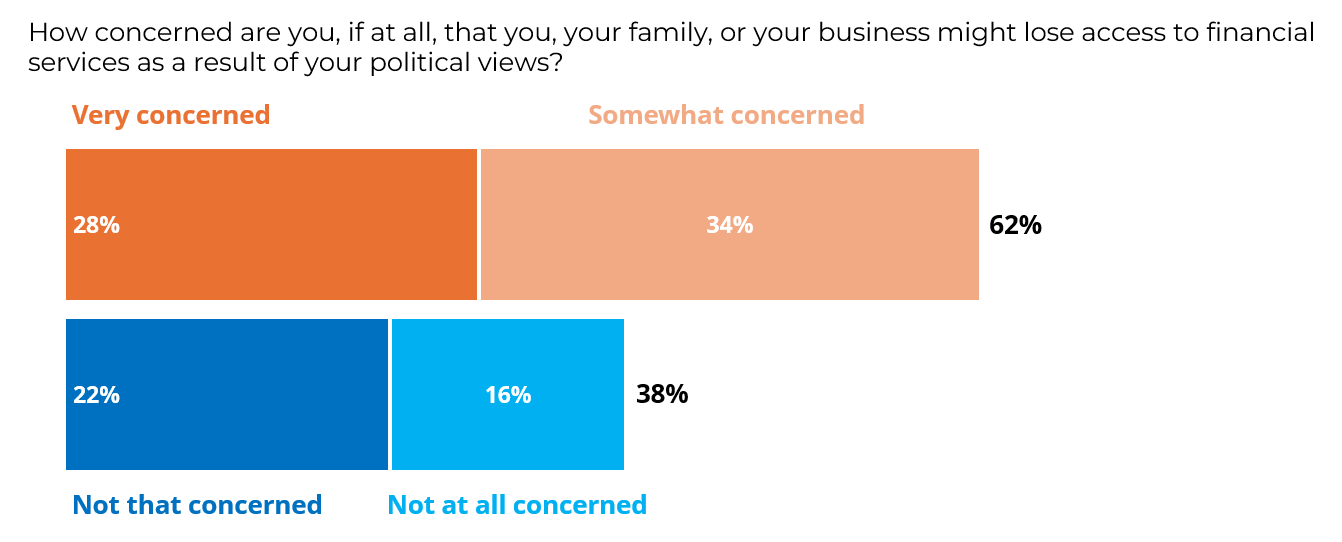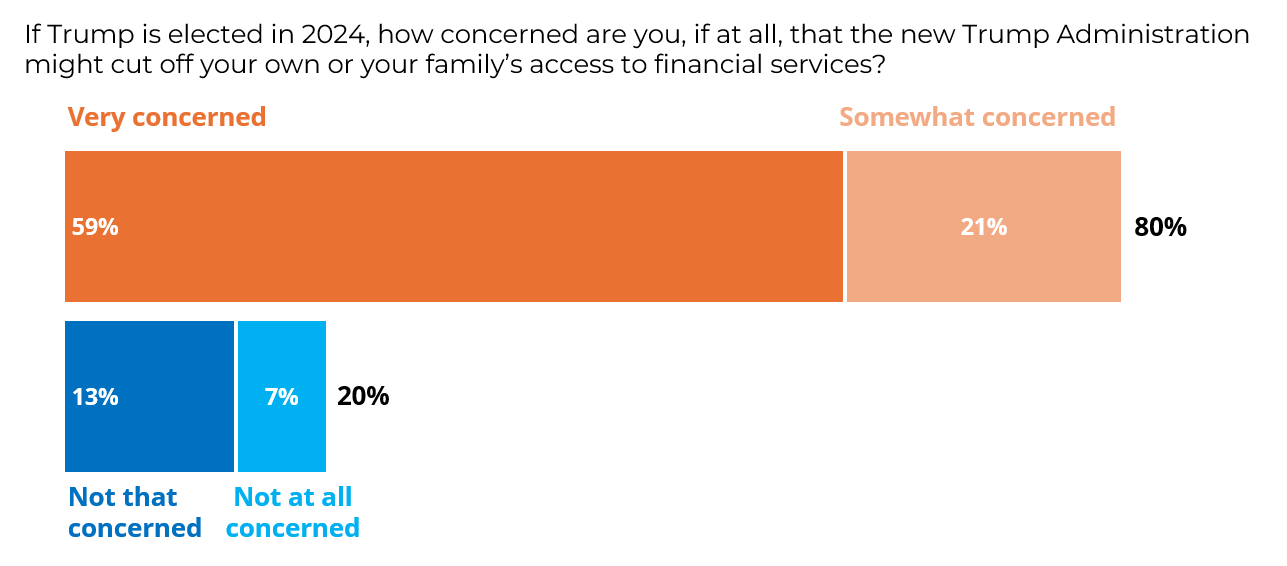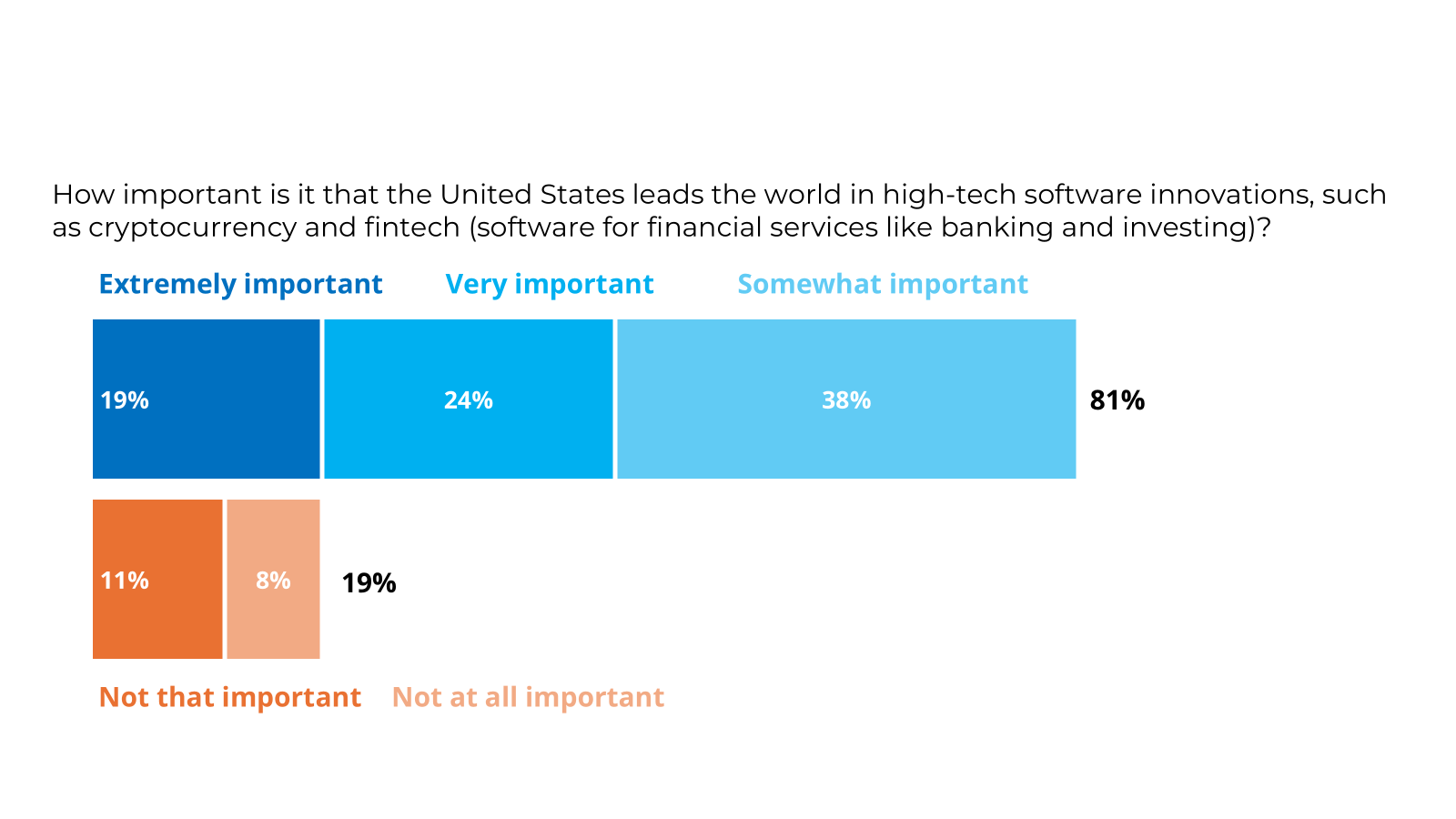Annotated: Paradigm’s July 2024 Democratic Public Opinion Poll
Paradigm, a cryptocurrency-focused venture capital firm, has joined the ranks of cryptocurrency companies and blockchain advocacy groups that are commissioning polls ostensibly to learn more about crypto sentiment among American voters.
A previous poll, commissioned by the Digital Currency Group and published by the crypto lobbying group The Blockchain Association, summarized their findings in incredibly misleading ways to try to pave the way for a narrative that there are a substantial number of single-issue voters who are likely to support pro-crypto candidates, regardless of other policy positions, in upcoming elections. Another, commissioned by Coinbase, is the source of “data” on crypto ownership that has been repeated by the industry, its lobbyists, and lawmakers alike, despite being extremely dubious.
Instead of seeking to understand voter sentiment around crypto, these polls were nakedly designed to solicit desired responses. The responses, in turn, were summarized by the crypto firms in reports that were clearly designed to try to convince lawmakers and candidates that cryptocurrency is a major voter issue, and that they risk losing potentially substantial support from their constitutents if they fail to prostrate themselves before the industry. After all, these are hard numbers, and numbers are objective and concrete!
Does this poll, and the summary of its findings, suffer from the same flaws? Let’s dig in.
We’ll come back to this “primary takeaway”.
There may be “reports” (generally from the industry) that candidates and incumbent Congresspeople are “becoming pro-crypto”, but I would definitely like to see some better support for the claim that this is them “following the lead of their voters” and not, oh, I don’t know, related to the hundreds of millions of dollars available to candidates who are deferential to the industry.
I asked Paradigm for more detail about how the poll was conducted, and they informed me that it was conducted all online (unlike their June poll of Republicans, which was conducted by phone and online). They do not publicly note this, nor does their poll summary address the skew that this likely introduces.
A May 2024 online survey by the Federal Reserve notes: “Because the survey is conducted online, the sample population may be more technologically connected than the overall population, which could increase the share of adults reporting use of emerging technologies such as cryptocurrencies.” David Marker, fellow of the American Statistical Association and American Academy for the Advancement of Science and elected member of the International Statistical Institute, criticized the DCG poll for failing to include such a disclaimer, commenting: “Online surveys into crypto ownership can skew or misrepresent true figures, and they’re inherently limited, as they don’t factor in the digitally excluded on a topic that is directly related to digital comfort.”
At the very least, Paradigm should have disclosed the method by which respondents were surveyed, and preferably also proactively noted the potential skew this likely introduces.
Takeaway 1: Democratic crypto voters are up for grabs this November.
Making inroads with crypto owners could help Vice President Harris win back some wayward Democrats and increase her likelihood of winning. As of right now, there are 1-2% of Democrats who may be leaning towards Trump due the Biden Administration’s hostility to crypto.
They get right to the point about their goals with this survey. With polling that began just after Harris replaced Biden as the Democratic nominee and immediately began picking up steam, this poll seems to have been commissioned at least in part in hopes of convincing the Harris campaign, and those around her, that “making inroads with crypto owners” is something she needs to prioritize.
It also fits with the timing of their previous poll, which was trying to convince Trump that he needed to attract Republicans who own crypto while he was leading in the polls.
This is a bit of an odd data point, and odder still was the decision to highlight it as the very first finding, given it is also one of the weakest claims from this poll.
First, the math doesn’t really work out. I’ve confirmed with Paradigm that they were calculating from the following graphic the number of “non-Harris voters” (more on that in a second) who responded that the Biden admin was “too hostile” to cryptocurrency, and munging those two together to conclude that this segment thus “may be leaning towards Trump due the Biden Administration’s hostility to crypto”. However, this figure actually comes out to about 2.7%, which is not within the stated “1–2%” range. (13% of 804 respondents is 104.52; 21% of 104.52 is ~22; and 22 out of 804 people is ~2.7%.) I was informed they decided to provide a lower estimate in the summary than their polling suggested, because 2–3% “felt too aggressive”. But that raises the question: why bother polling if you’re just going to change the numbers?
Second, they did not ask any questions about whether the Biden admin’s perceived hostility might actually push these people to vote for Trump, nor do they provide any details about how many of these “non-Harris voters” would consider voting for Trump in general.
The scale on this first bar chart is hilarious, particularly juxtaposed above the chart just below it (which captures the full 100% of respondents, while the same amount of space fits maybe 30% of respondents for this question).
I can help them out a little bit by editing in the bar for the remainder of the “non-Harris voters” who don’t hold crypto:
Or perhaps scaling it down to the same proportions as the other chart, assuming the full width of the space represents 100%:
Ahh, much better.
- Of the 804 Democrats we polled, 13% said they were not voting for Harris as they are either voting for Trump, a third-party candidate, or are still undecided.
- Trump-supporting Democrats are far more likely to have brought cryptocurrency than the rest of those polled. 18% of non-Harris Democrats have bought crypto, and Trump-supporting Democrats have bought at two times that rate.
- Additionally, 21% of non-Harris voters say that the Biden Administration has been “a little too hostile” or “much too hostile” on crypto.
Takeaway 2: Democrats are worried about losing purchasing power and being cut off from the financial system.
A core goal of crypto – giving people greater ability to maintain financial privacy – resonates with Democrats. Contrary to some suppositions, Democratic voters recognize the dangers of mass surveillance.
Financial privacy is a core belief for Democratic voters.
- 72% of respondents agreed that “personal financial transactions should generally be kept private, and only made available to government agencies when needed for specific purposes.”
This 15% is going to love blockchains, then. Cryptocurrency’s reputation as a useful tool for tax evasion has primarily been a result of the IRS’s lack of interest in scrutinizing once niche categories of transactions — and that is something that has been changing in recent times.
Notably, this poll did not ask any questions about respondents’ opinions on using cryptocurrencies to achieve financial privacy, and instead is simply assuming that respondents who want financial privacy would support crypto, and vice versa.
Okay, putting the sarcasm aside for a minute here: please for the love of god do not put your abortions on the blockchain! Do not try to pay for your or another person’s abortion using crypto, or encourage others to do so! This is an incredibly dangerous idea, as states are working to criminalize not only abortion, but also punish those who try to provide aid to others who need them. While there are a handful of cryptocurrencies that seek to provide some privacy for those who transact with them, the vast majority of popular cryptocurrencies do not.
Another thing: while it’s good of Paradigm to note the importance of financial privacy in situations where people are seeking medical care that has been criminalized or may be criminalized in the future, they should perhaps consider also not funding the campaign of a candidate who has supported incredibly strict anti-abortion laws, described abortion rights activists as “demonic”, and said that abortion is a “religious sacrifice to these [abortion rights activists].” (Paradigm contributed $500,000 to the cryptocurrency super PACs, which have spent about $583,000 on Blake Masters’ fortunately unsuccessful Republican primary campaign in Arizona’s District 8.)
Nearly all Democrats are also worried about protecting their purchasing power, matching the views of Republicans and Independents:
Takeaway 3: Crypto is most popular among Democratic voters of color.
When Democrats come out as pro-crypto, they are following the lead of their own non-white base voters, who view crypto positively. Previous Paradigm polling has shown that crypto ownership and support is strongest among non-white voters, and that is also true among non-white Democrats.
- 18% of Democrats have bought crypto in the past.
- This number rises to 22% among Black Democrats, 25% among Hispanic Democrats, and 27% among Asian American and Pacific Islander Democrats.
Paradigm seems to be using current or past ownership of cryptocurrencies as the metric by which they determine a person “views crypto positively”, which is flawed for reasons I’ve already described.
However, even if we put that aside and assume that the 18% figure (or 15–27% when broken down by race) actually represents support for cryptocurrencies, it would seem that Democratic politicians who “come out as pro-crypto” would in fact be failing to follow the lead of the remaining 82% (or 73–85%) of their constituents who don’t view crypto positively.
It’s also possible they’re reaching this conclusion from the later question (not captured in a graphic), stating that 13–32% of respondents say that “crypto plays a positive role in the U.S. economy”. If that’s the case, the inverse is roughly the same: 68–87% of respondents don’t view crypto positively.
The March 2024 Paradigm poll cited here claimed that “19% of American registered voters say they’ve bought crypto.” It is generally an interesting exercise to compare crypto industry polling results to polls from outside the industry (though there are variations in question formulation, namely with some polls asking about current crypto ownership vs. ever having owned crypto):
Non-industry-funded polls
- JPMorganChase, 2022: 15% of their American customers have conducted transfers to crypto accounts. (I suppose someone could argue that JPMorgan is an industry pollster, given their blockchain forays, but that is not their primary business. Take their numbers with grains of salt as you deem fit.)
- Pew Research Center, March 2023: 17% of American adults have ever invested in, traded or used a cryptocurrency
- Federal Reserve, 2023: 7% of American adults hold or use cryptocurrency
Industry-funded polls
- Andreessen Horowitz, December 2021: 20% of American registered voters own crypto
- Coinbase, 2022–20241: 18.2% of American adults own crypto (varies over time between 16% and 22%)
- Paradigm, March 2024: 19% of American registered voters have ever invested in, traded or used a cryptocurrency such as Bitcoin or Ethereum
- DCG, April 2024: 14% of registered voters in six swing states own crypto; 26% own or have previously owned crypto
To their credit, Paradigm’s March poll is reasonably close to the Pew and JPMorgan surveys, particularly when compared to crypto industry surveys that have polled current crypto ownership and come in way higher than non-industry polls. In this poll, Paradigm asks about the amount of cryptocurrency respondents currently own later on, revealing that 12% of their respondents currently own crypto (leaving 6% in the “former owner” bucket). This is quite high compared to the Federal Reserve’s numbers, but considerably lower than the 20% figure Coinbase and others like to throw around.
Paradigm also claimed to me that they’ve found that providing examples of cryptocurrencies in their question (“have you ever invested in, traded or used a cryptocurrency such as Bitcoin or Ethereum?”) results in higher affirmative responses. This is surprising to me, since it would seem to suggest a significant number of people hold BTC or ETH but don’t view them as cryptocurrencies.
Other recent polls (including Pew’s) have had similar findings to Paradigm’s: that people of color are somewhat more likely to have owned crypto than white respondents. This is generally treated by the cryptocurrency industry as a positive thing, and some influential crypto figures like to describe crypto as a particular opportunity for people of color to “build generational wealth” or access financial services they have historically not been able to access (sometimes using tactics that have been described as “predatory inclusion”).
However, the higher crypto ownership among people of color is a fairly recent development — and one that means that many of these investors bought in at all-time-highs in 2020 and 2021, with many later losing much of it in the 2022 crash. “[R]ecent polls show a sharp decline in the share of Black Americans holding bitcoin, indicating that many folks might have bought high and sold low,” reported Annie Lowrey in The Atlantic in November 2022.
To be clear, crypto is the most popular among non-white Democrats regardless of ownership.
- 28% of Black Democrats, 32% of Hispanic Democrats, and 27% of AAPI Democrats say that crypto plays a positive role in the U.S. economy. This is a massive jump compared to 13% of White Democrats who said the same.
Takeaway 4: Crypto ownership is likely to grow among Democrats in the next 12 months.
More Democratic voters are saying they plan to buy crypto in the next 12 months than have ever bought it before. If you needed additional proof that Democrats are warming to crypto, this is a fire bell in the night.
This is inaccurate. As the poll states in the second bullet point below, 17% of non-crypto-holding Democrats say they plan to purchase crypto in the next year, whereas 18% of Democrats overall have already bought crypto.
I suspect this is an artifact of an earlier error in this poll summary. Bullet point two originally read: “This means about 27% of Democrats who haven’t yet bought crypto are likely to buy in the next year.” That seemed extremely high to me as a percentage of non-crypto-holding respondents, and after I inquired, Paradigm corrected the bullet point to 17%. However, they seem to have missed this conclusory sentence up here when making that correction.
Polling by Morning Consult (the firm that has been doing the polling for both Andreessen Horowitz and Coinbase mentioned above)1 has claimed that the percentage of respondents who were “likely to purchase cryptocurrency in the next month” has hovered relatively stably between 20% and 26% ever since they began polling in January 2022. However, the same polls also suggest that the percentage of respondents who hold crypto has remained relatively stable, with some increase going into April 2023, and some decline over the past year. The Federal Reserve survey shows declining cryptocurrency ownership from 2021 to 2023.
This suggests that, far from being a “fire bell in the night”, this may just be a poor indicator of actual future adoption. Either that, or people are getting out of crypto in such numbers that they are more than offsetting these supposed new adopters.
- 9% of Democrats say they are very likely to invest in crypto in the next year, and another 18% of Democrats are somewhat likely to invest.
- 27% of Democrats are likely to buy in the next year, including about 17% of Democrats who have never previously bought.
Takeaway 5: Crypto ownership among Democrats is approaching parity with stock ownership and continues to grow.
Based on our data, millions of Democratic voters own tens of thousands of dollars of crypto. These are significant holdings for any asset, the kind that drive voting behavior:
- At present, 18% of Democrats have bought crypto, with 12% currently owning and 6% having previously bought it but no longer owning it. 33% of respondents currently own stock.
- 8% of Democrats first bought crypto within the last year, with 3% having bought crypto in the past few months and 2% buying in the past few weeks.
- 8% of respondents say they currently own more $1000 in crypto
- 5% of respondents own more than $10,000 in crypto.
These figures don’t really line up with other estimates, such as from a 2022 JPMorgan survey that claimed that “the median gross amount transferred to crypto accounts over the period 2015 through the first half of 2022 was approximately $620”. They also found that, out of people who hold crypto, about 11–15% of them have transferred one month of income or more into crypto accounts, and 4–6% have transfered three or more months of income. Doing some extremely rough napkin math: the median monthly income is approximately $5,000. JPMorgan found that 15% of their sample had transferred funds to crypto accounts. 11–15% of that 15% is 1.65–2.25% of the total sample who have transferred, based on median income, $5,000 or more. 4–6% of that 15% is 0.6–0.9% who have transferred, based on median income, $15,000 or more.
- Underscoring crypto’s popularity among non-white Democrats, 10% of Hispanic Democrats polled own more than $10,000 in crypto, and 9% of AAPI Democrats own more than $10,000 in crypto.
Is it just me or do these seem like surprisingly round numbers? Usually things like this have a bit of a long tail to them, and it seems unlikely that there are really the same number of people who own between $25,000 and $50,000 of crypto as there are those who own more than $100,000. It makes me wonder if Paradigm is rounding each group up to the nearest whole number, and then compounding the error by adding the rounded numbers together. Paradigm did not immediately respond to a follow-up question about this detail.
Takeaway 6: Much like Republican voters, Democratic voters are concerned about being cut off from the financial system, especially under a second Trump Administration.
Democratic voters are open to options outside the traditional financial system, and want financial freedom as much as Republicans. The specter of another Trump Administration is creating intense pressure on Democrats to find alternative means of protecting their access to financial services.
This portion of the poll summary was by far the most surprising to me. I asked Paradigm for more details on this question, but they told me that they had not given respondents examples of what this might look like, nor did they collect open-ended responses or do interviews to get a better sense of what people were envisioning when they responded in this way.
While it doesn’t surprise me that there are people who are concerned about losing access to financial services generally speaking, or perhaps about cutbacks of programs like social security, food or housing assistance, or Medicare/Medicaid, I was surprised to see such a high percentage of people who believed that a) that this would come as a direct result of their political views, and that b) it would affect them personally (vs. some hypothetical more radical person — for example, someone running an abortion fund — who might end up in the crosshairs of a politically motivated debanking campaign).
I wonder to what extent people are thinking less of politically motivated termination of financial services and are instead reflecting their broader concerns about financial topics like inflation and housing affordability.
Paradigm seemed surprised by the results as well.
Continuing what I was saying above, I was really surprised at just how many people believe that they personally (or their family) might be cut off from financial services, versus agreeing that Trump is likely to cut of some people’s access to financial services.
But, as I said previously, this is another one of those questions that implies that crypto is one of these “alternative means of protecting their access to financial services” that they mention above, without actually asking respondents about their opinions about crypto’s viability for such a purpose.
Takeaway 7: Democrats want the United States to be a world leader in crypto.
Democrats want crypto innovation in the United States:
- 43% of Democrats said it was either very important or extremely important that the “United States leads the world in high-tech software innovations such as cryptocurrency and fintech,” with another 38% saying it was somewhat important.
- Just 8% of Democrats said the U.S. leading the world in these innovations was “not at all important”.
It seems to me that if you’re looking to find out if “Democrats want the United States to be a world leader in crypto”, you should ask questions like “How important is it that the United States leads the world in cryptocurrency?”, and not “How important is it that the United States leads the world in high-tech software innovations, such as cryptocurrency and fintech (software for financial services like banking and investing)?”
I, for one, think the US has a long ways to go when it comes to fintech, which could be so much better. I’m not too precious about where that software is developed, but as an American I’d sure love to be able to use it instead of still having to write checks from time to time, so I’d probably answer somewhere in the “important” spectrum on a question like this. Does this mean I think the US should be a “world leader in crypto”? No. Does it mean that I think the way to make US crypto and fintech firms “world leaders” is to slash regulations? Also no.
Altogether, this poll is a mixed bag. Compared to some of the other industry polls, Paradigm does seem to have paid more attention to ensuring a representative sample; the Paradigm person I spoke to told me that they had taken care to ask some level-setting questions regarding things like who they’d voted for in the past, which they were then able to compare with other polls to check that they roughly aligned.
However, as I mention in my commentary throughout, many of the questions seem designed to elicit specific responses that could then be used in the summary to imply strong support for cryptocurrency, despite not mentioning the topic. While I have no issue with Paradigm deciding to poll about, say, financial privacy, attitudes about inflation, or concerns about access to financial services, they should not be using those responses to suggest that Democrats support cryptocurrency when they haven't actually asked the respondents about cryptocurrency in relation to those issues.
Finally, Paradigm’s bias as a cryptocurrency firm shines through this poll summary, much as has happened with other industry polls, making clear that the goal of these exercises is not to learn more about or educate people about attitudes towards cryptocurrency, but rather to try to convince people that cryptocurrency is a major issue in the upcoming elections.
While bias perhaps ought to be expected from industry-funded polling, these polls are often cited in the media and by politicians as if they were neutral, often without clearly disclosing the poll source. This is why I feel it’s so important to expose the flaws and biases in these summaries. Even if it may not be possible to convince the industry to do more objective polling (and, critically, write more objective summaries of these polls), I at least hope to inform people about the flaws, and urge journalists and others to be extremely cautious about citing them.
Footnotes
- The methodology of this survey has been heavily criticized by statistician David Marker in an interview with crypto critic Jake Donoghue. Marker opined, “This survey has not provided enough information to refute claims of it being low quality and spurious. [Morning Consult] hasn’t presented evidence to make you feel comfortable… with a survey which was funded by an organization which would like and benefit from these results.” He noted that there was a “potentially nullifying” flaw in the survey methodology; Morning Consult did not respond to repeated requests for clarification on this point, despite having responded to other questions from those commentators previously.
- “Do you, personally, or jointly with a spouse, have any money invested in the stock market right now -- either in an individual stock, a stock mutual fund, or in a self-directed 401(k) or IRA?”
- “Personal investments in stocks/bonds/mutual funds other than those held in an IRA/401(k)”
Copyright to the original poll summary belongs to Paradigm, and it can be read in its original form in full at policy.paradigm.xyz. It is republished here for the purposes of critical commentary.
Molly White has a cryptocurrency disclosure.
Built with annotate.
![Have you ever invested in, traded, or used a cryptocurrency such as Bitcoin or Ethereum? Yes
Non-Harris Voters, yes, 18%
[This is represented by a blue bar that takes up roughly 60% of the available space]
Thinking about how the Biden Administration has handled cryptocurrency, do you think its approach has been...
Non-Harris Voters
[Horizontal bar chart]
Too Friendly 11%
Just About Right 16%
Don't Know 52%
Too Hostile 21%](https://storage.mollywhite.net/micro/dem_polling_image_1.png)

